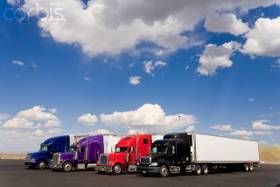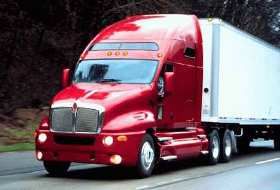Swift Or Prime For CDL Training
Topic 3625 | Page 1

I am in the same spot you are… trying to decide who to go with.. From the research I have conducted, I'm pretty confident Im going with Prime…. I got the impression Swift was great for more experienced students…. And, Prime appears to pay better.
I know its hard to do the pro/con list, they both seem to be good companies….
Good Luck, Wendy

Theron, you'll need to do your own research, but I'd say Prime. They have a shorter commitment time for the 'free' CDL schooling. I believe they also pay better during training, but you'll have to double check. Swift has more freight diversity - i.e. intermodal , tons of dry van jobs. Prime is basically reefer , flatbed, and tanker. With Swift you might have more hometime options, depending on where you live. Prime has NE Regional gigs, but that won't help you much if you're in another part of the country.
A lot of this will come down to you. You'll need to research the ins and outs of hauling different freight, e.g. reefer vs dry van etc. Not saying you're thinking this way, but making a decision based purely on which company has the higher cpm is very short-sighted - lots of prospective drivers, rookies, and even some experienced drivers (who should know better) will do this. Miles is just as much a part of the paycheck as cpm. The only way you would know that is if you researched it or had somebody tell you, like I just did. 
So keep asking questions, but you'll definitely need to take the initiative so you'll make a better informed decision, and ultimately that will mean you'll be more happy with your decision(s).
CDL:
Commercial Driver's License (CDL)
A CDL is required to drive any of the following vehicles:
- Any combination of vehicles with a gross combined weight rating (GCWR) of 26,001 or more pounds, providing the gross vehicle weight rating (GVWR) of the vehicle being towed is in excess of 10,000 pounds.
- Any single vehicle with a GVWR of 26,001 or more pounds, or any such vehicle towing another not in excess of 10,000 pounds.
- Any vehicle, regardless of size, designed to transport 16 or more persons, including the driver.
- Any vehicle required by federal regulations to be placarded while transporting hazardous materials.
Regional:
Regional Route
Usually refers to a driver hauling freight within one particular region of the country. You might be in the "Southeast Regional Division" or "Midwest Regional". Regional route drivers often get home on the weekends which is one of the main appeals for this type of route.
Intermodal:
Transporting freight using two or more transportation modes. An example would be freight that is moved by truck from the shipper's dock to the rail yard, then placed on a train to the next rail yard, and finally returned to a truck for delivery to the receiving customer.
In trucking when you hear someone refer to an intermodal job they're normally talking about hauling shipping containers to and from the shipyards and railyards.
Dry Van:
A trailer or truck that that requires no special attention, such as refrigeration, that hauls regular palletted, boxed, or floor-loaded freight. The most common type of trailer in trucking.CPM:
Cents Per Mile
Drivers are often paid by the mile and it's given in cents per mile, or cpm.
Reefer:
A refrigerated trailer.

On this site you will not likely get a straight answer to that question and that's good because only you can truly answer it. But you will find a lot of Prime drivers on here. They are both excellent choices to start your career.

Theron, you'll need to do your own research, but I'd say Prime. They have a shorter commitment time for the 'free' CDL schooling. I believe they also pay better during training, but you'll have to double check. Swift has more freight diversity - i.e. intermodal , tons of dry van jobs. Prime is basically reefer , flatbed, and tanker. With Swift you might have more hometime options, depending on where you live. Prime has NE Regional gigs, but that won't help you much if you're in another part of the country.
A lot of this will come down to you. You'll need to research the ins and outs of hauling different freight, e.g. reefer vs dry van etc. Not saying you're thinking this way, but making a decision based purely on which company has the higher cpm is very short-sighted - lots of prospective drivers, rookies, and even some experienced drivers (who should know better) will do this. Miles is just as much a part of the paycheck as cpm. The only way you would know that is if you researched it or had somebody tell you, like I just did.
So keep asking questions, but you'll definitely need to take the initiative so you'll make a better informed decision, and ultimately that will mean you'll be more happy with your decision(s).
Thanks man
CDL:
Commercial Driver's License (CDL)
A CDL is required to drive any of the following vehicles:
- Any combination of vehicles with a gross combined weight rating (GCWR) of 26,001 or more pounds, providing the gross vehicle weight rating (GVWR) of the vehicle being towed is in excess of 10,000 pounds.
- Any single vehicle with a GVWR of 26,001 or more pounds, or any such vehicle towing another not in excess of 10,000 pounds.
- Any vehicle, regardless of size, designed to transport 16 or more persons, including the driver.
- Any vehicle required by federal regulations to be placarded while transporting hazardous materials.
Regional:
Regional Route
Usually refers to a driver hauling freight within one particular region of the country. You might be in the "Southeast Regional Division" or "Midwest Regional". Regional route drivers often get home on the weekends which is one of the main appeals for this type of route.
Intermodal:
Transporting freight using two or more transportation modes. An example would be freight that is moved by truck from the shipper's dock to the rail yard, then placed on a train to the next rail yard, and finally returned to a truck for delivery to the receiving customer.
In trucking when you hear someone refer to an intermodal job they're normally talking about hauling shipping containers to and from the shipyards and railyards.
Dry Van:
A trailer or truck that that requires no special attention, such as refrigeration, that hauls regular palletted, boxed, or floor-loaded freight. The most common type of trailer in trucking.CPM:
Cents Per Mile
Drivers are often paid by the mile and it's given in cents per mile, or cpm.
Reefer:
A refrigerated trailer.
Swift pays the industry standard. But has many regional opportunities available.
Prime pays way above industry standards.
Trucks are both equal quality, except Swifts trailer are no where close to the quality of primes trailers.
Both have the same OTR hometime policies. Both are giant companies with many terminals and corporate accounts.
So the real decision is:
1. Less pay by chance for a gig to get home more often.
2. More pay but be on the road for at least a month.
I personally drive for Prime. Wouldn't drive for anyone else OTR.
Terminal:
A facility where trucking companies operate out of, or their "home base" if you will. A lot of major companies have multiple terminals around the country which usually consist of the main office building, a drop lot for trailers, and sometimes a repair shop and wash facilities.
Regional:
Regional Route
Usually refers to a driver hauling freight within one particular region of the country. You might be in the "Southeast Regional Division" or "Midwest Regional". Regional route drivers often get home on the weekends which is one of the main appeals for this type of route.
OTR:
Over The Road
OTR driving normally means you'll be hauling freight to various customers throughout your company's hauling region. It often entails being gone from home for two to three weeks at a time.

Swift pays the industry standard. But has many regional opportunities available.
Prime pays way above industry standards.
Trucks are both equal quality, except Swifts trailer are no where close to the quality of primes trailers.
Both have the same OTR hometime policies. Both are giant companies with many terminals and corporate accounts.
So the real decision is:
1. Less pay by chance for a gig to get home more often.
2. More pay but be on the road for at least a month.
I personally drive for Prime. Wouldn't drive for anyone else OTR.
Does Prime give raises like swift? Or do they start you out with a certain pay & no raises. & what is starting pay
Terminal:
A facility where trucking companies operate out of, or their "home base" if you will. A lot of major companies have multiple terminals around the country which usually consist of the main office building, a drop lot for trailers, and sometimes a repair shop and wash facilities.
Regional:
Regional Route
Usually refers to a driver hauling freight within one particular region of the country. You might be in the "Southeast Regional Division" or "Midwest Regional". Regional route drivers often get home on the weekends which is one of the main appeals for this type of route.
OTR:
Over The Road
OTR driving normally means you'll be hauling freight to various customers throughout your company's hauling region. It often entails being gone from home for two to three weeks at a time.
New Reply:
New! Check out our help videos for a better understanding of our forum features

















Preview:








 TT On Facebook
TT On Facebook
Hello all you fellow truckers. I have considering trucking for a while now & I think no am finally ready to give it a shot. I am stuck between choosing a company to train with. Could you guys tell me if Swift or Prime would be the better choice & why? Thanks!
OOS:
When a violation by either a driver or company is confirmed, an out-of-service order removes either the driver or the vehicle from the roadway until the violation is corrected.